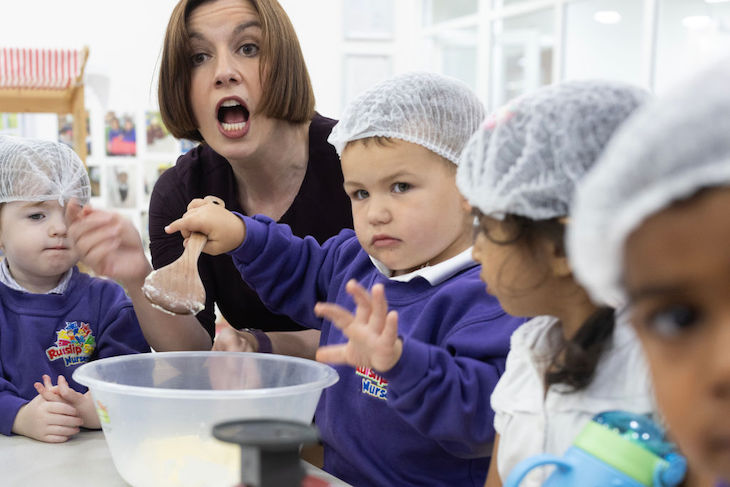Bridget Phillipson and I have a lot in common. Like the Education Secretary, who started life in a council house in Tyne and Wear, I grew up on a tough estate. Mine was in Selston, a rural East Midlands mining village. Home life was hard; my mam was blind and illiterate. But against the odds – like Phillipson – I achieved outstanding results at my local state school. Decades on, I’m still proud that my grade As in physics, maths and English were O-Levels, not wishy-washy GCSEs.
Labour’s mooted education review would almost certainly kick the ladder out from under kids like me
Yet while our backgrounds are similar, I couldn’t disagree more with Phillipson’s curriculum shake-up. These changes will make life harder, rather than easier, for the Phillipsons and Scotts growing up today.
The curriculum and assessment review, headed by Prof. Becky Francis, took a year to come up with its plan, unveiled this week, for improving standards. Its suggestions inspire little confidence. The recommendations include cutting the length of exams and slimming down the content of GCSEs, binning the English Baccalaureate set of GCSE subjects introduced by Michael Gove and focusing more on social diversity.
The old system was far from perfect, but a less demanding Progress 8 backed up by nebulous nonsense like ‘civic engagement’ and ‘climate’ is not going to help kids in places like Selston. The headteacher of the high-achieving Michaela Community School in Wembley, Katharine Birbalsingh – who knows a thing or two about this stuff – has said these changes will ‘ruin our schools and the life-chances for the poor’. As one of those rare poor kids who, thanks to rigorous educational standards, managed to achieve far more than I ever dreamed was possible, I’m inclined to agree.
The English Baccalaureate, which helped to raise standards, is a particular loss. While private schools will continue to focus heavily on attainment in key subjects like English and maths, there is a risk that those in the state sector won’t now be held to the same standards. This, of course, will do nothing to encourage social mobility. The number of those taking GCSEs in foreign languages at state school is also likely to fall. Needless to say, it’s unlikely that will happen in posh private schools, where teachers know the advantage of pupils being able to speak more than one language.
When it comes to learning English, pupils are also likely to be held to less demanding standards. Attention to detail on grammar could become a thing of the past thanks to Phillipson’s planned changes.
There are some good suggestions in the review, but not many. A greater focus on science sounds wise, but this will only work if schools can find the teachers. This is far from guaranteed. And more music and arts? Yeah, we’ll have some of that! In fact, fellow East Midlander James Graham – from just up the road in Mansfield – used last year’s MacTaggart Lecture to highlight class equality in the creative industries. Mind you, even if Phillipson manages to find enough money to make it work, I’m not sure how useful top notch GCSEs in Harold Pinter and jazz flute will be in an area blighted by over 30 per cent economic activity amongst 16-64-year-olds.
Not to worry, at least this generation’s nippers, including the grandchildren or even great grandchildren of miners, will be learning about the evils of climate change. Hooray! And what’s this about ‘a new core enrichment entitlement for every pupil’? Apparently, it will include sport – don’t UK schools already feature PE? – resilience and civic engagement. Does surviving a childhood in a low income family with both parents out of work count as resilience? Is handing over your football boots to that galumphing bully from Rawson Street civic engagement?
Almost 40 years ago, when I moved to London and was making something of my life in an unfamiliar city that marked me down as a nobody, it was those impressive ‘core subject’ exam results that kept me going. While I didn’t have money, connections or family to fall back on, I was a clever bugger – I could build a radio transmitter, fiddle about with complex mathematical equations, quote Sillitoe and Lydon, and I’d been cooking for myself since the age of seven. That’s what helped set me apart.
I’m not saying it was easy. There was zero help or encouragement from my parents. Private tutors hadn’t been invented; certainly not on our estate. But all that sweat, testing and harsh grading – and occasional classroom humiliation – meant that I was ready for anything those insufferable Londoners could throw at me. Unfortunately, were I growing up today, Labour’s mooted education review would almost certainly kick the ladder out from under kids like me.
Phillipson has made much of her humble origins, and she is right to feel proud of making it from a council house to the cabinet, via Oxford. But, tragically, she appears to lack an understanding that a robust education helped her on the path to success. Good luck to the kids of the future: they’ll certainly need it under this Labour government.






Comments